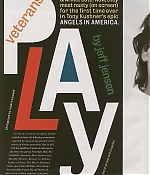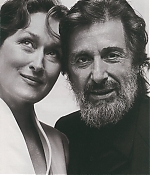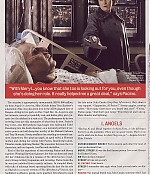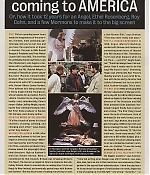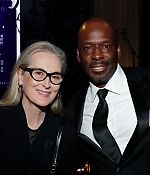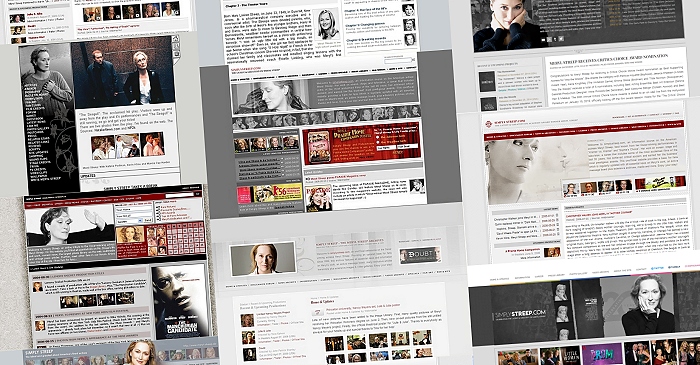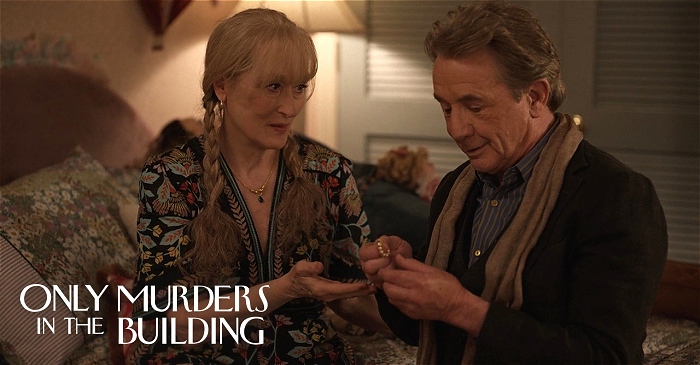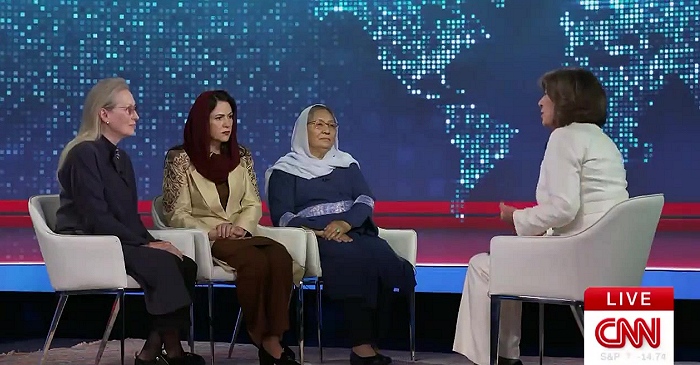
|
Veterans Play
Entertainment Weekly ·
December 05, 2003
· Written by Jeff Jensen
|
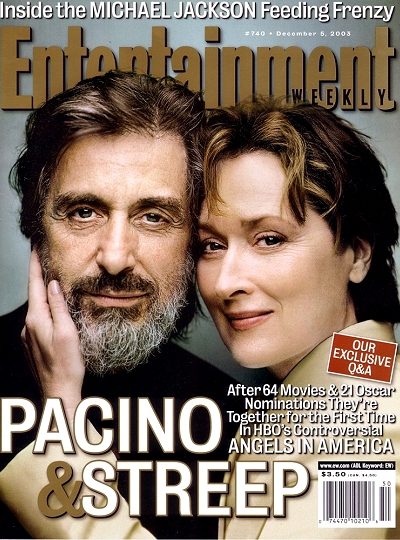
Any bio of Al Pacino or Meryl Streep usually includes the following assessment: regarded by many as the greatest actor/actress of his/her generation. But to hell with the qualifiers. Pacino and Streep are the best ever, period. No hedge. Him: “The Godfather,” “Scarface,” “Heat,” “Serpico;” her: “The Deer Hunter,” “Kramer vs. Kramer,” “Sophie’s Choice,” “The Hours.” Between them, more than 60 films. No overlap. Yes, incredibly, Pacino, 63, and Streep, 54, have never worked together. Until now. The occasion is appropriately monumental: HBO’s $60 million, six-hour “Angels in America.” Mike Nichols helms Tony Kushner’s adaptation of his own play about love in the AIDS-plagued time of Reagan. Airing in two parts on Dec. 7 and Dec. 14, Angels is epic but intimate, surreal yet painfully real, and defies pithy plot synopsis (see the sidebar for a stab at it). The performances by its two towering icons are tidy summaries of what they do best. Pacino’s Roy Cohn – the McCarthyite legal eagle who railroaded Ethel Rosenberg into the death chamber – is a textured portrait of corrosive power and self-deception worthy of his Michael Corleone and Tony Montana. Streep reaffirms her standing as cinema’s canniest chameleon: She plays an angel, an aged rabbi, a Mormon mother, and, during her scenes with Pacino, Rosenberg’s ghost. Thunder cracks, lightning flashes: The encounter between the two characters, and two legends, terrifies and electrifies. Kind of like the experience of interviewing Pacino and Streep together. Wearing blue-tinted glasses, her hair cut short and cruel (for her villainous role in a remake of “The Manchurian Candidate”), Streep is feisty, loquacious, and revealing. Pacino looks like he was just unfolded from a musty suitcase. In rumpled black, with tufts of unkempt beard sprouting from his face (for his role as Shylock in a movie version of “The Merchant of Venice”), the Godfather is effusive, genial, more guarded. Introduced to each other 27 years ago by Pacino’s friend and Streep’s then boyfriend, the late actor John Cazale (“Dog Day Afternoon”), they share a cozy rapport. “Cappuccino, Al Pacino?” Streep giggles, pouring coffee. “How many times have you heard that one?” “Thirty,” Pacino quips. “And that’s just today.” Then they sit and look up. More thunder and lightning.
I. ANGELS
“Having Al and Meryl together, in these films, is like driving a Ferrari on the autobahn. There are no speed limits. There is no end to what can be done, to where they can go.” – “Angels” director Mike Nichols
ENTERTAINMENT WEEKLY You’ve known each other for most of your professional lives.
MERYL STREEP Al was the first famous person I ever met. Except for Richard Nixon.
EW How do they compare?
STREEP Al was not as scary.
AL PACINO I was looser.
STREEP I remember that night when I met you and made you dinner –
PACINO Our mutual friend was John Cazale, someone who I had known since I was a teenager. That was our initial connection. He said, “Al, you’ve got to see this girl. This is it.” [Streep shrieks with laughter.] I never heard anyone talk about someone like that. I certainly had not heard John talk like that. They were doing a play together in the park
STREEP Measure for Measure. Great play.
EW Were you nervous meeting Al?
STREEP Yeah! I remember the old “Godfather” days, walking around with you downtown. It was horrible. People would scream at you. I determined I was never going to get famous.
PACINO People relate to you because of the attending celebrity baggage –
STREEP No, it isn’t about your baggage – it’s about the fact that your face is 40 feet big on the screen!
PACINO Right.
STREEP It’s like the ancient Greek actors who made shoes so that they would get bigger on stage – you’re sort of the modern-day gods or something. And you can’t help it; you can’t help making that assumption that the person is bigger than who they are.
PACINO I remember a woman grabbing my hand, an elderly Italian woman, and she kissed it, as if to say “Godfather.” But I don’t know if that’s the way it is anymore.
STREEP Now everybody is famous. It’s a little bit easier.
EW What’s your favorite Pacino performance?
STREEP I probably haven’t seen everything you’ve done.
PACINO Excuse me?
STREEP I know. He wouldn’t have let me work on this picture if he’d known that. I’m not pumping you, but this [“Angels”] is one of my favorites. The one where you couldn’t go to sleep? “Insomnia?” I just thought, “How can this man surprise me again and again?” But “Dog Day Afternoon” is one of my favorite movies in the world.
PACINO And if you’re talking about Meryl, I’ve seen them all over and over again…. I was just watching the one where she played the Australian -“A Cry in the Dark.” I watch “Out of Africa” all the time.
EW “Angels in America.” Why did you want to participate in this project?
STREEP There are certain things that come along that you just don’t even get a vote on. This material, its ambition, the people involved – irresistible. Irresistible. This is a rare artist, Tony Kushner, and that his work would be lifted out of a context where a limited number of people could see it, into a sort of amplification – that’s why I wanted to do it.
PACINO I agree completely. It’s in the pantheon of Great Things.
EW Do you find that the politics of the play, which are very much steeped in the Reagan era, are still relevant today?
PACINO I feel it sort of resonates more. It’s almost like a painting. When we saw it 10, 12 years ago, we were in the painting –
STREEP Yeah yeah yeah –
PACINO – and now we’re able to back away from it, take a look at it, and we see more, and experience it in another way.
EW The scenes that you have together…
STREEP [in her Ethel Rosenberg Noo Yawk accent] He took forever to die.
PACINO Oh, yeah. [Laughs] It was a complicated scene from a technical standpoint..
STREEP But it was fun. All the scenes were shot in a little room, so the intensity of the scene was built-in –
PACINO And with Meryl, you really feel very close to someone like her, because she just projects that “thing.” And you know that she too is looking out for you, even though she’s doing her role. It really helped me a great deal.
STREEP I felt the same thing. We didn’t know each other’s way of working, but we trusted each other…. We were sort of on our own, because they were all out in another room, watching a video monitor. Some things you can see on a video monitor; some things you can’t. Drives me crazy, you know, when they sit back there in, like, Afghanistan, watching while you’re miles away –
PACINO It’s a new thing. In the old days, we didn’t have that. You’d have the person in your face.
EW It appears in some scenes you’re not even acting in the same physical space together, due to the fact that you, Meryl, are playing a ghost – or at least his delusion.
STREEP Right. Sometimes he was talking to an empty chair. [Laughs] I was at the craft-services table, eating.
II. THE MECCA
“My first day with her, I both dreaded it and was thrilled by it. It must be strange to be her. She is Mecca for actors. For her to come to work, and know that across from you is someone who is hanging on your every syllable, and that you can either ruin that someone’s day or make it – that must be a strange place to live in. You get over it, of course. I was always looking for a flaw, something to make her more human. She’s Meryl Streep, but she can also be funny and catty and like…sort of a normal actress.” – “Angels” costar Justin Kirk
EW Do you sense when your fellow actors are intimidated by you?
STREEP You feel that – right?
PACINO Yeah. What happens is that eventually they see that we’re all together on this thing.
STREEP The first time you forget your lines, they’re all fine. That happens real fast with me.
EW Meryl, you play a Mormon, a rabbi, you play a “Celestial Principality,” and Ethel Rosenberg. What was it like to prepare for and then juggle all those roles?
STREEP No problem. [Smiles]
EW No problem?
PACINO She could do that and a whole lot of things. That’s what she does.
STREEP They were all aspects of me.
EW What aspect was the rabbi?
STREEP My father. Didn’t realize this until I saw it. My father was there, and I didn’t even know I was doing it. I wasn’t really thinking about much. I didn’t prepare a great deal. I did go to Williamsburg [Brooklyn] and had some kreplach – you know, “to prepare.”
PACINO Oh, that gives you credibility. [Streep laughs.]
EW One thing about both your performances in “Angels” – and historically, in your careers – is that vanity is not an issue. Meryl, your rabbi has these awful teeth, and Al, you’re just falling apart. Are a lot of actors these days reluctant to “play ugly”? Why is it easy for you guys?
PACINO Well, it’s not vanity for certain actors – it’s their career. That’s what people want to see. They want to see them “in that way.” I don’t find actors, for the most part, are that vain. Do you?
STREEP [Laughs as she hides behind her hand and points at Pacino]
PACINO Maybe there’s something wrong with me.
STREEP [sarcastic] Actors? Actresses? Vain? Gee, I don’t know…
PACINO [Laughs] I would like someone to give me a note: “self-centered, self-involved.”
EW I meant it in the sense that you kinda…
STREEP – don’t care if we look like hell. If I had any advice for young actors or actresses – especially actresses, because men have a lot more freedom in this area – it’s to establish early on that you’re going to send [vanity] away. Send it packing.
PACINO You’ve got to know if your “look” is getting in the way. If you’re a brain surgeon, and you’ve got muscles the size of Schwarzenegger’s –
STREEP Lots of surgeons have big muscles. They’re very vain.
PACINO Well, now they do – because of films. [Laughs]
STREEP People so want to set you in a box. You know, early on, I had this long blond hair, and I could see it coming down like a train, it was going to mow me over: I was going to be this sort of mournful, long-blond-hair woman, and it’s reductive. It’s reductive of my humanity and my engine. I have much more to give than that.
EW Speaking of that long blond hair – you don’t have it right now.
PACINO You look great with that hair, by the way.
STREEP Thank you. “Manchurian Candidate.”
PACINO Nice. Very attractive hair color.
STREEP Thank you. Just like yours. That’s why you like it. [Pacino laughs.]
III. THE BADASS
“[Pacino] came of age in that era of filmmaking where films could say something, mean something about the world around. There was that stretch where it seemed every single film he did was a landmark. A career like his showed me what can be done. It’s different now. Films are more measured as commodities. But he inspired me, and continues to inspire me.” – “Angels” costar Jeffrey Wright
EW Roy Cohn. Very complex. Very nasty guy.
STREEP [to Pacino] Where did you find that?
EW Exactly.
PACINO You know, I didn’t know Roy Cohn, and Tony, I’m sure, didn’t know him. But he uses Roy Cohn as a symbol and even says in the play, this has no resemblance to the real person…. I realize, trying to do biopics from time to time, that the best work is usually the most fictionalized.
EW Why?
PACINO Because it becomes a part of the artist’s expression. It’s not literal.
STREEP It’s a jumping-off place.
PACINO And from there, you could go anywhere.
STREEP I’ve played people that really existed, and always, you’re looking for, say, what’s reckless in me, what’s murderous in me, what’s cowardly in me. That’s always where you find the thing that’s gonna translate into something people can understand and receive themselves.
EW But I think that would be a challenge when it comes to a guy like Roy Cohn. I don’t like to think I have anything in common with him.
STREEP [forcefully] Yeah, well, you do. I got news for you. You’re writing for ENTERTAINMENT WEEKLY. So you’re ambitious. You’re staying on top of the cultural thing. You’re looking at people real hard that you’re interviewing. You’re –
PACINO You’re a human being.
EW [Gulp]
STREEP We love characters like Roy Cohn. Richard III. Hannibal Lecter. We love the monsters because you’re entertained by them and you imagine that they’re not like you – but that’s the thing that really pulls you in. There is a connection. Revenge. It’s a great thing to get, isn’t it? And Roy can do it. He can pick up a phone and get revenge on anyone. And you wish you could do that.
PACINO Like Scarface. Who wouldn’t want to be the guy who can say to the guy who’s about to cut your head off with a chain saw, “Screw you.” [Laughs]
STREEP They don’t make that many movies about Mister Rogers.
PACINO Every one I make, it fails. [Laughs]
STREEP They don’t make movies about mild-mannered men. They make movies about Roy Cohn men.
EW Meryl saw aspects of herself in her characters. What of yourself do you see in Roy Cohn?
PACINO Uh…aspects…I would say…uh, a lot of things. Certain things, you relate to. I don’t do this consciously, mind you. All I do is keep looking at the role and think, “It’s a blank canvas. I don’t know what the hell to do!”
STREEP “Why did they hire me? I gotta get out of this.” That’s what I always think.
PACINO Yeah, and then I finally realize, “But I can’t just go quit, so I have to do something.” I’m not kidding. This happens most of the time…. I did look at Roy Cohn films, knowing it wasn’t going to help me that much. But it still gave me something to focus on. For me, I love the whole idea of sitting with something for a period of time absorbing it. Just being alone with a role, living with it, thinking about it.
EW So unlike Roy Cohn, you don’t consider yourselves a “person of clout” in your business? Do you feel like you don’t have power?
STREEP I don’t think about it except when they put the list out of who does.
EW Do you look for yourself at all in those lists?
STREEP I’m joking.
PACINO Power is the fact that if you do something successful, then there’s a possibility that if you say yes to something, it has a greater chance of being made. But only those very few – young, usually – have that power. I mean, Tom Cruise could do anything.
STREEP But you have a power in two places. You have “box office power.” But you also have a power of respect among your fellow actors, and that’s very gratifying. When you call up people and say, “I want to do this play downtown. There’s no money. I’m only going to do 14 performances, and we’re going to work six months on it,” everybody wants to do it.
PACINO [self-deprecating laugh] That’s why nobody’s answering my calls lately.
STREEP But it’s a nice thing.
EW Speaking of nice things, Meryl: The American Film Institute is giving you next year’s lifetime achievement award.
STREEP [Growls]
EW You’re not looking forward to this?
STREEP Oh, no. I’m very excited.
EW The look on your face says something different.
STREEP You have your recorder on.
EW Ah.
PACINO Some parts of ourselves are very shy in terms of that kind of attention.
STREEP And we get plenty. We get so much attention. My God. I mean, that’s the problem. You know, I love what I do and I’ve been very, very well rewarded for it, and this is a great honor, but I can’t help thinking… [Sighs]
EW You know, Al, the same week the AFI announced Meryl’s award, another outlet named you the “biggest movie badass” of all time.
STREEP “Movie badass”?
PACINO [Laughs]
STREEP I feel…I’m offended by that! It’s just so reductive of what his achievement is! Sorry, it is.
PACINO My late, beloved grandmother would not have liked it. [Streep laughs.] But it’s good. Because, you know, let’s face it: Some of those characters were badasses. – (Additional reporting by Howard Ho)



Posted on November 17th, 2024
|
Posted on November 7th, 2024
|
Posted on November 1st, 2024
|
Posted on October 10th, 2024
|
Posted on September 26th, 2024
|


